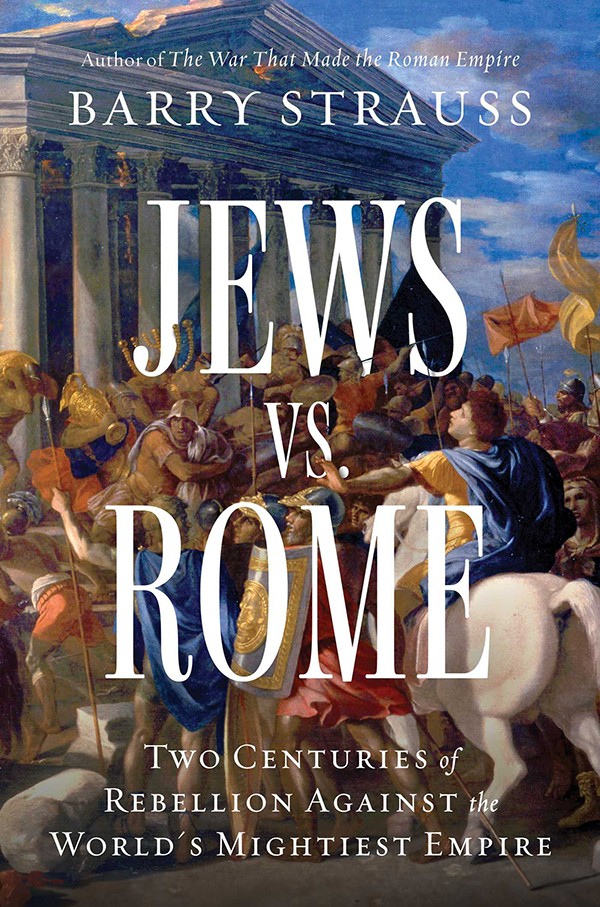For two centuries, the Jews of Judea - ancient Israel - waged rebellion against the power of the Roman Empire. Although they never succeeded in throwing off the Roman yoke, the tales of their resilience form a stirring narrative described in the new book "Jews vs. Rome: Two Centuries of Rebellion Against the World's Mightiest Empire," by Barry Strauss '74, the Bryce and Edith M. Bowmar Professor in Humanistic Studies Emeritus in the College of Arts and Sciences.
"It was amazing in writing this to see how little has changed in the geopolitics of the region: Israel, a small state between large empires, was also the situation in antiquity," Strauss said.
He sees many parallels between then - a period roughly spanning from 63 B.C.E. to 136 C.E. - and now, as well as many lessons. "One is that Israel and Iran are not natural enemies - in fact, just the opposite. Geostrategically, there's no reason why these two states should not be allies. Iran's rival and sometimes enemy for centuries has been the Ottoman Empire/Turkey - it hasn't been Israel - while Rome was looking over Judea's shoulder to Parthia," the ancestor to present-day Iran, he said.
The Chronicle spoke with Strauss about the book.
Q: Was trying to control Judea really worth it to Rome, given all the trouble that it caused?
A: Judea does have one thing that's very valuable to the Romans, and that is balsam. But I don't think it's so valuable that it's worth conquering Judea. Balsam is a fragrant plant resin used in perfume and also for medicinal purposes and as an ingredient in holy oil. However, Judea is the pathway between Syria and Egypt, so it's really hard to give that up. I think it would be pretty clear to Rome that if you give up Judea, Judea is going to inevitably turn towards their allies in Parthia - their Iranian allies. I think for those reasons the Romans don't feel they can give it up.
Q: Given how much greater the Roman Empire's resources were compared to Judea's, why was Judea so difficult to control?
A: The Roman Empire is about 3,000 miles from one end to the other and it has around 50 million people in it. The Romans have an army of 300,000 men. That's not a very big army to control an empire that's so large. The inevitable result is that there are rebellions right, left and center. What's unusual about the Jews in Judea is how many rebellions that they have and how intense they are - but they are not unusual in rebelling.
The other reason is that the Jews are a free people with a military tradition who have succeeded in driving out an empire: the Seleucids, the Greco-Syrian Empire. They also have a tradition of Jewish soldiers in Egypt working for the Ptolemies and in Mesopotamia, working for the Seleucids, and then for the Parthians. They are an international force, the Jews of Judea; they have support from the diaspora, both in the Roman Empire and outside it, in the Parthian Empire. So Judea is an engine of resistance, and the Romans find it very difficult to defeat, because it keeps coming back.
And the Jews believe that they are capable of defeating empires with God's help. We're talking about a very religious period in Jewish history, in which many people believe that the Apocalypse is coming, that the Messiah is surely going to show up.
One of the lessons for this period is that there's a fine line at best between religion and politics in a place like Judea. If you believe that this country is the Holy Land and that the only legitimate ruler is God, then anything else is going to be illegitimate. The Romans think once they've destroyed the Temple it's done, but they're wrong because they underestimate the Torah, and they underestimate the other sources of resistance that exist in the society.
Q: You've written many books on the Roman Empire. Was there anything that caught you by surprise as you were researching this book?
A: When I started writing this book, I thought, I'm not going to find many women. But I was wrong. There are a number of women in this story who are very important.
In particular my mind was a bit blown by the story of Queen Helena of Adiabene, the ancient equivalent of today's Iraqi Kurdistan. I had only the vaguest knowledge of her existence, but just think that she converted to Judaism and built palaces in Jerusalem; later, her grandsons fought for the Jewish rebels against Rome. It's Helena who comes to the rescue of the people of Judea when there's a famine and arranges for food to come from abroad to feed the people of Judea. The fact that she appears so often in the Talmud, that she has conversations with sages, really surprised me.
Linda B. Glaser is news and media relations manager for the College of Arts and Sciences.







